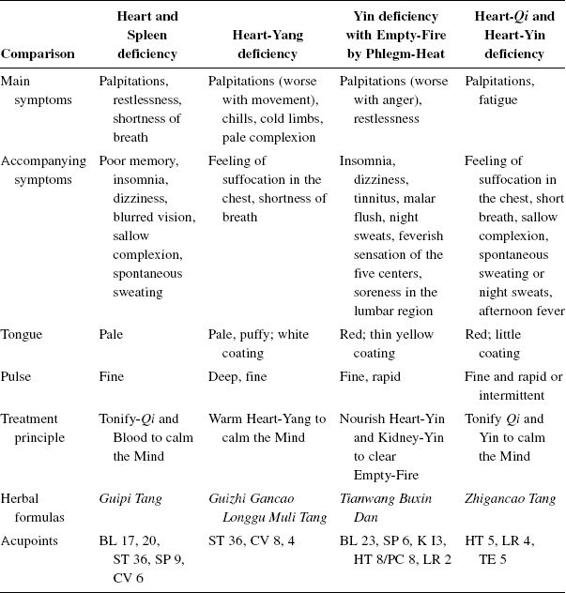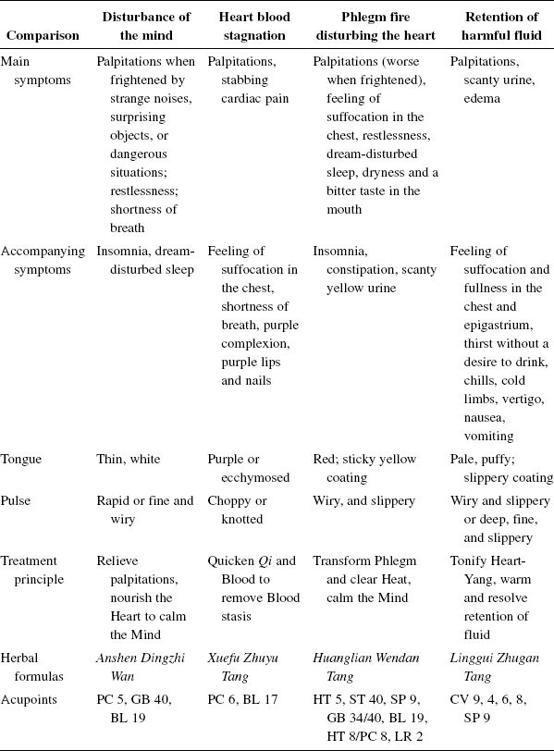The Introduction of Palpitations
Definition
Palpitations mean an unduly rapid action of the heart, which is felt by the patient and accompanied by nervousness and restlessness.
TCM names for palpitations
- Xin Ji (“Heart Fright”)
- Jing Ji
- Zheng Zhong
Corresponding Western diseases
- Heart diseases like coronary heart disease, hypertensive heart disease, pulmonary heart disease, and rheumatic heart disease.
- Neurosis.
- Arrhythmia.
- Asthma.
- Dyspnea.
- Dizziness and vertigo.
- Edema.
- Menopause.
The Etiology of Palpitations
- Invasion of the Heart by EPFs blocks Heart vessels or damages Heart-Qi or Heart-Yin, which leads to palpitations.
- Improper diet or overstrain injures the Spleen, which then produces less Blood to nourish the Heart, or produces Phlegm and Damp which block the Heart.
- Emotional disturbance like anxiety, excessive worry, or overthinking leads to Liver-Qi stagnation and consumes Heart-Qi and Heart-Yin.
- Congenital deficiency, prolonged illness, and drug overdose (especially of digitalis, adrenaline, atropine, Aconite, or Ephedra) create Heart-, Kidney-, Spleen-Yang Qi deficiency or Heart- and Kidney-Yin deficiency.
The Pathology of Palpitations
Organs involved
The chief organ is the Heart. Associated organs are the Kidney, Spleen, Liver, Gall Bladder, and Lung.
Chief pathology
- Excess: disturbance of the Heart by pathogenic Qi (Phlegm, retained fluids, Fire, Qi stagnation, Blood stasis).
- Deficiency: the Heart is deprived of nourishment.
How to Diagnose and differentiate Palpitations
(see Table 28)
Disease differentiation
(1)Jing Ji vs. Zheng Zhong
Jing Ji and Zheng Zhong both mean palpitations. Jing in is the mild case, while Zheng Zhong is the severe case. Jing Ji is usually triggered by emotional frustration and lasts a short period. Zheng Zhong is caused by Heart deficiency or a weak constitution and is due to chronic disease. It can be triggered any time, even without emotional frustration, and tends to persist over a long period.

Basic points: BL 15, 14, CV 14, 17, HT 7, PC 6.

Basic points: BL 15, 14, CV 14, 17, HT 7, P C6.
(2)Palpitations vs. Chest Bi
- Both show palpitations and a Knotted, Intermittent pulse.
- For Chest Bi, stabbing chest pain (paroxysmal attack) is the most prominent symptom; the pain can radiate to the arm and shoulder. Chest Bi is similar to angina and heart attack in Western medicine.
Differentiation of syndromes
(1)Excess vs. deficiency
- Deficiency:
- Qi, Blood, Yin or Yang fails to nourish the Heart.
- Excess:
- Phlegm-Fire disturbs the Heart.
- Blood stasis or harmful fluids block the Heart collaterals.
(2)Pay careful attention to the pulse:
- Usually a Knotted or Intermittent pulse.
- Deep, Slow →Yang Qi deficiency with interior Cold.
- Fine, Weak, moderate → both Qi and Blood deficiency.
- Knotted → severe deficiency or Phlegm-Blood stasis blockage.
- Intermittent → severe Zang–Fu organ deficiency (mostly Heart-Qi).
- Choppy → Blood stasis.
- Scattered → severe condition (not found in people who can make their way to the clinic).
- Fine, Choppy → Blood deficiency.
- Rapid, Wiry, Slippery (Phlegm-Fire).
- Wiry, Slippery, Full with chronic disease; the pulse does not correspond to disease (bad sign).
(3)Combine Western medical history and physical examination to know Western disease diagnosis.
The Treatment of Palpitations
(see Table 28)
Principle of treatment
(1)Balance Biao and Ben
Determine which is primary (Ben) and which is secondary (Biao):
- In remission, treat Ben if Biao is not urgent at all; or if there are mild Biao symptoms, treat Ben (primary) and Biao (secondary).
- During an attack, treat Biao only if it is urgent, or treat both Biao (primary) and Ben (secondary) if they are both urgent.
(2)Based on pathology
Deficiency:
- Tonify Qi, Blood, Yin or Yang, depending on which is affected.
Excess:
- Transform Phlegm for the Phlegm pattern.
- Remove Blood stasis if it is present.
- Move Qi for Qi stagnation.
- Dispel Cold for the Cold pattern.
Mixed pattern:
- Combine treatment principles accordingly.
(3)Regulate Qi and blood
Qi and Blood stasis in the chest is a common pathological element of palpitations. When working with herbs, usually add herbs to regulate Qi and Blood (Danggui, Danshen, Chuanxiong). Meditation and deep breathing exercises can also work well to relieve palpitations.
(4)Calm the mind
It is usually necessary to calm the Mind when palpitations are present, because there is an association between palpitations and the Mind.
Acupuncture
Choose Points from:
- Heart Meridian
- Pericardium Meridian
- Back Shu points
- Front Mu points
(1)General points
- BL 15, 14
- CV 14, 17
- HT 7
- PC 6
- Huatuojiaji T 4, 5
(2)Modifications
- Heart-Yang deficiency → add moxa.
- Premature contractions often cause palpitations → add SP 6.
- Tachycardia → ST 36.
- Atrial fibrillation (the p-wave disappears) → CV 17 (subcutaneously downward if there are palpitations or chest pain, or point to the left or right side), LI 11.
- Fright → PC 6.
- Excessive sweating → BL 43.
- Restlessness → PC 8.
- Tinnitus → TE 3.
- Malar flush → KI 3.
- Constipation → BL 25.
- Edema → moxa CV 9.
Auricular treatment
- Heart
- Subcortex
- Kidney
- Liver
- Chest
- Brain
- Tachycardia → add Sympathetic, Shenmen, Occipital
- Bradycardia → add Adrenal Gland, San Jiao
Choose three or four points each time. Needles or seeds are applicable.

